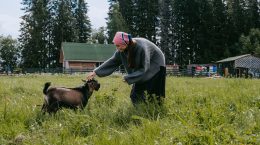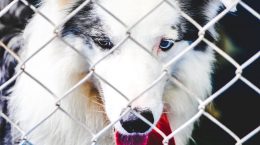Agriculture in Belarus is under the dictator’s control. But cows and pigs living on farms are as disenfranchised as domestic cats and dogs. Perhaps, the imperfections of the system are most noticeable in the example of farm animals: the lack of competitive salaries for veterinarians and, as a result, veterinary care for sick animals, the lack of order on farms (despite constant inspections by Lukashenka), the lack of attention for ungulates. Today we will tell you what is happening on Belarusian farms.
The death of livestock in farms is a frequent phenomenon. Relevant messages appear in the media almost every month. However, there is a nuance: only independent media and Telegram channels write about this. For example, in 2013, a report appeared in the opposition media about the mass death of pigs in the Volozhin district. Residents reported African swine fever. The Ministry of Emergency Situations killed the cattle – the animals’ owners got a tiny compensation. The press service of the Ministry of Agriculture and Food did not comment on this. And the Committee on agriculture and food of the Ministry of Executive Committee blamed imported feed brought by businessmen for everything, and there is no epidemic in the area. The journalists recalled that in 2012, the mass slaughter and burning of pigs in the Novogrudok district was explained by exercises.
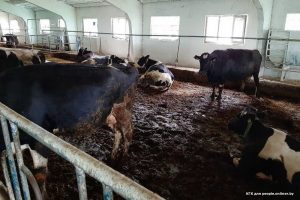 At the same time, the state press shows only cleanliness and order on farms, well-groomed and affectionate cows, praises local authorities and accuses the West and Europe of creating fakes. And no wonder – the dictator personally controls the maintenance of cows on farms. In March 2019, at the farm of the “Kupalovskaya” agricultural holding in the Shklov district, Lukashenko, without hesitating in his expressions, stood up for the ungulates, saying that Auschwitz was here, they were standing in manure. After this trip, the Minister of Agriculture and Food Leonid Zayats was removed from his post and went to work as chairman of the Mogilev Regional Executive Committee. However, they did not take better care of the cows at the enterprise: a few months later, animal cruelty was recorded in the same area at the Ulanovo farm.
At the same time, the state press shows only cleanliness and order on farms, well-groomed and affectionate cows, praises local authorities and accuses the West and Europe of creating fakes. And no wonder – the dictator personally controls the maintenance of cows on farms. In March 2019, at the farm of the “Kupalovskaya” agricultural holding in the Shklov district, Lukashenko, without hesitating in his expressions, stood up for the ungulates, saying that Auschwitz was here, they were standing in manure. After this trip, the Minister of Agriculture and Food Leonid Zayats was removed from his post and went to work as chairman of the Mogilev Regional Executive Committee. However, they did not take better care of the cows at the enterprise: a few months later, animal cruelty was recorded in the same area at the Ulanovo farm.
“Piles of manure, dirty and exhausted cows. Sick, lame. 70% of cows are infected, including Staphylococcus aureus – such milk is harmful even for calves. They keep extra livestock specifically to show good milk yields since it is considered to be a cow. And there are 200 more heads there. They don’t even fit in cages – cows stand there like herrings in a barrel. The cow can’t even lie down to rest,” the farmworkers shared.
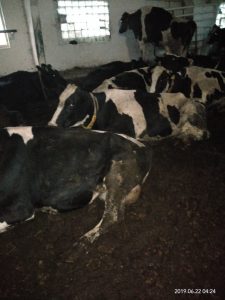 In the same year, problems were found in Parshino village, Gorki district. The website of one of the independent media posted photos of dirty cows with injuries, irritation on the udder. Ungulates had to lie in manure puddles, not on clean bedding – but the local authorities did not care. When the journalists arrived at the farm, its administration said: the photos shown on the Internet are not truthful, but there is one honest one from this farm. It is a photo with dead calves: as explained at the enterprise, two calves fell due to hypotrophy, the rest are stillborn. It is abnormal, in the opinion of the management, that there were four stillborn calves. The State Control Committee reported, that employees cleaned manure untimely, individual premises were in poor condition, animals had exhaustion, sick hooves, gynaecological diseases. Violations, according to representatives of the department, were corrected after their visit.
In the same year, problems were found in Parshino village, Gorki district. The website of one of the independent media posted photos of dirty cows with injuries, irritation on the udder. Ungulates had to lie in manure puddles, not on clean bedding – but the local authorities did not care. When the journalists arrived at the farm, its administration said: the photos shown on the Internet are not truthful, but there is one honest one from this farm. It is a photo with dead calves: as explained at the enterprise, two calves fell due to hypotrophy, the rest are stillborn. It is abnormal, in the opinion of the management, that there were four stillborn calves. The State Control Committee reported, that employees cleaned manure untimely, individual premises were in poor condition, animals had exhaustion, sick hooves, gynaecological diseases. Violations, according to representatives of the department, were corrected after their visit.
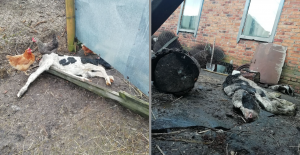 In February 2020, in the village of Streshin, Zhlobin district, diseased cows were transported to the yards and sheds of local farmworkers. Before that, a video from the complex appeared on the Internet. There, cows died stuck in manure, and their corpses were near the farm in the middle of a field. According to the company’s employees, the cattle were dying of hunger and lack of supervision, and ordinary workers were paying for mismanagement. It was they who had to hide the corpses of animals to hide the mass death of livestock. The police opened a criminal case against the head of the agricultural enterprise Olga Kamai. The staff also complained about her, but they got threatens with dismissal. When the journalists who published the photos of the deceased cows contacted the company for comment, Olga Kamai said that all these were rumours, but she would not say anything.
In February 2020, in the village of Streshin, Zhlobin district, diseased cows were transported to the yards and sheds of local farmworkers. Before that, a video from the complex appeared on the Internet. There, cows died stuck in manure, and their corpses were near the farm in the middle of a field. According to the company’s employees, the cattle were dying of hunger and lack of supervision, and ordinary workers were paying for mismanagement. It was they who had to hide the corpses of animals to hide the mass death of livestock. The police opened a criminal case against the head of the agricultural enterprise Olga Kamai. The staff also complained about her, but they got threatens with dismissal. When the journalists who published the photos of the deceased cows contacted the company for comment, Olga Kamai said that all these were rumours, but she would not say anything.
In June 2021, a video from Druhaya Slobodka village, Petrikov district, got on the Internet. Remains of dead cows and calves were around the local farm, and the cattle lived in terrible conditions and received spoiled silage as feed. Dissatisfied employees were forced to remain silent under the threat of dismissal. By the way, the salary on the farm is only 200 rubles, but people are afraid to lose this too.
Instead of understanding the problem of animals deaths on farms and punishing the perpetrators, it is much easier for the state media to explain what is happening with fakes. “It was clear right away: it’s fake. But why is it needed? Probably, not everyone likes the stable work, the forward movement of our enterprises. But they are,” Dmitry Pimoshenko, chairman of the Mstislav district executive Committee, told reporters of the newspaper controlled by Lukashenka. In his district, there was information about exhausted and hungry cows on one of the farms. The feather sharks went to inspect the enterprise – and, as usual, found nothing.
“By all indications, the command to attack Belarusian agriculture was given from “above” with the promise of an additional payment. Maybe they hope that the Poles will not catch the general meaning, only keywords like “cows”, – a journalist of the state “Selskaya Gazeta” writes. However, the article does not specify who gave the order to attack agriculture. Nor does it explain why Poles need to know about the condition of cows at Belarusian enterprises and how this information can annoy dictator Lukashenko. And most importantly, no article provides information about what may be the cause of the death of livestock and what salary employees of agricultural enterprises receive.
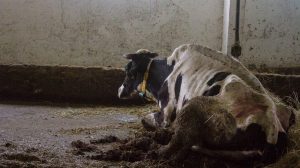 There are more than a thousand vacancies of veterinarians in Belarus. Salaries are different: in the capital – 1000-1200 rubles, in the regions – 500-800 rubles. Almost no one goes to work in agriculture voluntarily – most often, they are students on assignment who work in slave conditions for two to five years. Sometimes they are allocated houses for use (sometimes without gas heating, furniture, with high utility bills). Much less often, college and university graduates manage to get rid of servitude. In 2019, a candid story of a veterinarian on the distribution appeared on the Internet, who could not withstand the moral pressure in the team, specific leadership and lack of money.
There are more than a thousand vacancies of veterinarians in Belarus. Salaries are different: in the capital – 1000-1200 rubles, in the regions – 500-800 rubles. Almost no one goes to work in agriculture voluntarily – most often, they are students on assignment who work in slave conditions for two to five years. Sometimes they are allocated houses for use (sometimes without gas heating, furniture, with high utility bills). Much less often, college and university graduates manage to get rid of servitude. In 2019, a candid story of a veterinarian on the distribution appeared on the Internet, who could not withstand the moral pressure in the team, specific leadership and lack of money.
“After much testing, I realized that most collective farms in Belarus are just farms drowning in manure, and there is nothing good there. They gave us housing: the five of us lived in a “three-piece”. The lifting costs are small: only 200 rubles – this is much less than all my classmates. The first salary was given two months later – at the end of September. We were supposed to be assigned a veterinarian who would prompt and help, but this did not happen. No one was going to explain anything to me. I was considered (and called) a fool, asked what I was taught in college. Worked at the complex: treated mastitis – was on the milking machine; sometimes it was necessary to work with calves. I had to do everything alone. They paid about 320 rubles. Of course, you can barely survive on such money,” said one of the students.
Another student worked on one of the farms of the Minsk region near the capital and also faced difficulties. She was not given an apartment because of the lack of money of the enterprise. Only after the childbirth, she managed to get a house – through without heating and amenities. The specialist complained about low salaries (370 rubles a month) and unfriendly relationships with the team – elderly and often drinking people.
“The work of a veterinarian on a collective farm is mainly in the treatment of cattle: in addition to mastitis, cows have a lot of gynaecological problems. In addition, it is necessary to monitor milking, keep documentation, check milk, monitor vaccination. If the case is – to draw up acts. No one is ready to help a young specialist, but they always demand much. The cows on the farm are more than a thousand, and there are only two paramedics, while my partner is an elderly man who has long been tired of his work,” the girl adds.
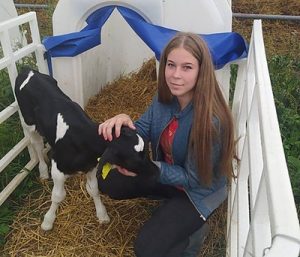 Belarusian agriculture also needs zootechnicians – 457 vacancies are on the Internet. Not far from the capital, you can find a job with a wage of 1000-1100 rubles. In the regions, the salaries of a zootechnician reach 400-750 rubles. Such vacancies (even with additional payments and houses for young specialists) do not attract Belarusians. And the problem is quite significant – they even talk about it on the pages of state media. “Two young specialists, having worked the required two years after the distribution, quit. Yurchenko failed to keep them. Although the salary on the farm is not bad, and they give housing. But the young people did not want to stay. There are not enough specialists in a suburban enterprise,” complains “SB. Belarus today”.
Belarusian agriculture also needs zootechnicians – 457 vacancies are on the Internet. Not far from the capital, you can find a job with a wage of 1000-1100 rubles. In the regions, the salaries of a zootechnician reach 400-750 rubles. Such vacancies (even with additional payments and houses for young specialists) do not attract Belarusians. And the problem is quite significant – they even talk about it on the pages of state media. “Two young specialists, having worked the required two years after the distribution, quit. Yurchenko failed to keep them. Although the salary on the farm is not bad, and they give housing. But the young people did not want to stay. There are not enough specialists in a suburban enterprise,” complains “SB. Belarus today”.
Another problem is the attitude towards personnel, which is not much different from prison. In 2017, the editorial office of “Charter 97” received a letter from Anastasia Kozak, a young farm worker in the Kamenets district. One morning, the chief zootechnician and the deputy for animal husbandry arrived at the farm. When Anastasia was left alone with them, they began asking her questions about what was not part of her duties. The specialist expressed her opinion – and received aggression in her address. When Anastasia announced that she would record the conversation on a dictaphone, the chief animal technician ran up to her and started hitting her in the face. The deputy for animal husbandry held the girl, twisting her arms. Anastasia managed to escape and call the police, but the director said she would not prove anything.
“We only hear insults addressed to us, shouts and mats from the main specialists. They can’t teach us anything either, and they don’t even try. We work for 12 hours a day, but we will still have 7 hours on the report card. Sunday should formally be a day off, although young professionals have to work seven days a week. It is impossible to get a vacation at all. The administration constantly calculated 100-150-200 rubles,” Anastasia shared.
At the beginning of 2021, the Council of Ministers decided to provide diesel fuel to farms at a significant discount, finance the repair and maintenance of equipment, buy spare parts, components, filters and oils. The state promised to help in the fertilizers, lime materials, seeds purchase. In total, from 2021 to 2025, the government plans to allocate $ 3.3 billion for agriculture. The state will also invest 42.3 million rubles in the construction of new dairy farms. It is difficult not to agree that government spends enormous resources on the industry – and, as you can see, there is still not enough money for decent salaries for specialists, for repairs and restoring order on farms, or for taking care of animals. But they are the suppliers of milk and meat. They certainly do not deserve to stand and lie in manure, suffer from illnesses and not receive treatment, die from the inaction of farm employees, who receive low salaries and do not want to work.
Belarus has become a prison not only for people – but also for animals: both cats and dogs, and cattle. We hope that after Lukashenka leaves the post of Belarusian leader, the situation will change. We believe that Belarusian cows and pigs will still see clean stalls, cosy bedding, will be able to eat their fill, and most importantly – will feel the love and care of a person.




